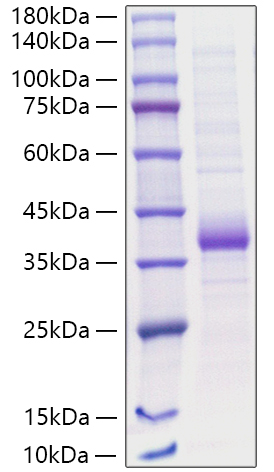Recombinant Human Carbonic anhydrase 5A/CA5A Protein (RPCB1091)
- SKU:
- RPCB1091
- Size:
- 10µg
- Tag:
- C-His
- Reactivity:
- Human
- Expression Host:
- HEK293 cells
Description
| Product Name: | Recombinant Human Carbonic anhydrase 5A/CA5A Protein |
| SKU: | RPCB1091 |
| Size: | 10µg |
| Tag: | C-His |
| Reactivity: | Human |
| Expression Host: | HEK293 cells |
| Protein Description: | High quality, high purity and low endotoxin recombinant Recombinant Human Carbonic anhydrase 5A/CA5A Protein , tested reactivity in HEK293 cells and has been validated in SDS-PAGE.100% guaranteed. |
| Endotoxin: | < 0.01EU/μg |
| Purity: | > 92% by SDS-PAGE. |
| Formulation: | Lyophilized from a 0.22 μm filtered solution of 50mM NaAc,50mM NaCl,0.05% Brij-35,pH 5.0. |
| Gene ID: | 763 |
Carbonic Anhydrase catalyzes the reversible reaction of CO2 + H2O = HCO3- + H+, which is fundamental to many processes such as respiration, renal tubular acidification and bone resorption (1). Topics in a CA meeting (6th International Conference on the CAs, June 20 - 25, 2003, Slovakia) ranged from the use of CAs as markers for tumor and hypoxia in the clinic, as a nutritional supplement in milk, and as a tool for CO2 removal and mosquito control in industry. Carbonic Anhydrase VA encoded by the CA5A gene is a mitochondrial protein (2, 3). In comparison with another mitochondrial CA (CA5B), CA5A has different tissue distribution and chromosomal location (4, 5). Expression and inhibitor studies of different CAs in the rat pancreatic beta cells indicate that CA5A may be involved in the regulation of insulin secretion (6). CA5A may also participate in the detoxification of ammonia produced in the gastrointestinal tract by providing bicarbonate to carbamyl phosphate synthetase I (7). The amino acid sequence of recombinant human CA5A (residues 40 to 305) is 79%, 77%, and 76% identical to that of canine, bovine, and rat/mouse.
| Storage: | Store at -20℃.Store the lyophilized protein at -20℃ to -80 ℃ up to 1 year from the date of receipt.After reconstitution, the protein solution is stable at -20℃ for 3 months, at 2-8℃ for up to 1 week. |
| Reconstitution: | Centrifuge the vial before opening. Reconstitute to a concentration of 0.1-0.5 mg/mL in sterile distilled water. Avoid vortex or vigorously pipetting the protein. For long term storage, it is recommended to add a carrier protein or stablizer (e.g. 0.1% BSA, 5% HSA, 10% FBS or 5% Trehalose), and aliquot the reconstituted protein solution to minimize free-thaw cycles. |
| Swiss-Prot: | P35218 |







